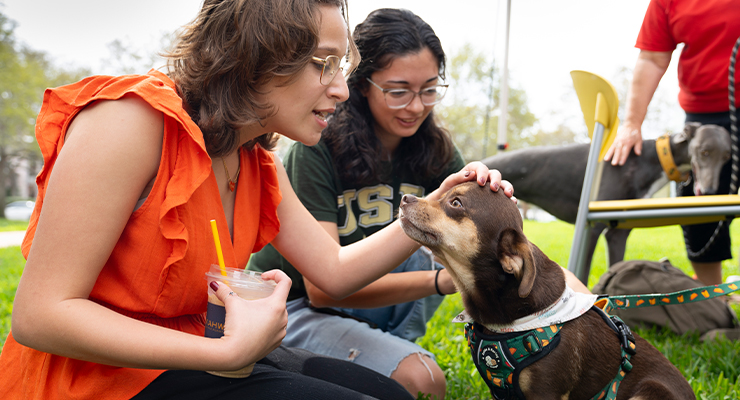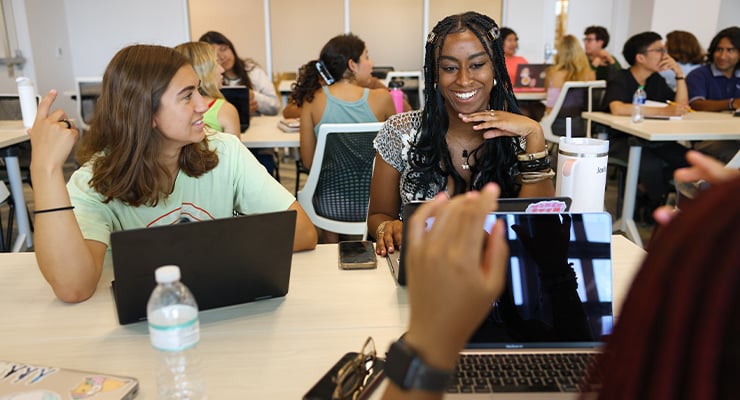Mental Health and Well-Being On Campus: What Resources You Can Count On
By Emily Young | Last Updated: Sep 4, 2025

Hey there! Maybe you clicked on this post because you’ve been feeling sad, lonely, or anxious, and you want to know how your college can help. Or maybe you simply want to be proactive about your health. Either way, you’ve come to the right place.
We’re here to walk you through the different mental health and wellness resources offered by many four-year colleges and universities. You’re already paying for these services through your tuition and fees. Why not take advantage of them?
Let’s take a look at what mental health and well-being campus resources you can count on.
Crisis Hotlines
Are you in distress right now? You don’t have to wait until the end of this blog post to get help. You can pick up the phone and call one of these crisis hotlines, whether or not you’re a currently enrolled college student:
- The national 988 hotline. It’s free, confidential, and available 24/7 to anyone in the U.S. In addition to the national 988 hotline, there is also the crisis text line. Anyone can text "home" to 741741 to engage in a chat conversation.
- Your local crisis center hotline, where a trained specialist will not only talk with you but also connect you to resources in your community. Whether you’re struggling with thoughts of self-harm, food insecurity, or just feeling overwhelmed, someone is waiting to help.
If you are enrolled at a university, you should also have access to a campus emergency line. USF students can call 813-974-2831, the after-hours line for the counseling center, and speak to a licensed mental health care professional 24/7. (If it’s a life-threatening emergency, please stop what you’re doing and call 911.)
Plan Ahead
Because you never know when hard times will hit, plan ahead by adding your school’s after-hours emergency number to your favorite phone contacts. That way, if a crisis does come up, all you have to do is press a button.
College Counseling Centers
If you’ve been struggling lately, you’re not the only one. College can be a stressful time. And the majority of college students – more than 60 percent – meet the criteria for at least one mental health issue. The good news is, most schools offer free, confidential counseling. Don’t hesitate to drop by your center and find out how they can help. The sooner you go, the better, says Scott Strader, the director of the USF Tampa Counseling Center.
But you don’t have to be struggling to talk to a therapist, Strader emphasizes. “There doesn't have to be something ‘wrong’ with you to seek counseling,” he says. “We are here to support students to be more successful academically, interpersonally, socially, and in their wellness journey.”
If you’re not taking advantage of campus counseling, you’re not getting the full benefit of a well-rounded college education. Therapy helps you understand yourself and others better, so you can develop the “soft skills” that will help you succeed in your life and career. Plus, therapy can simply make the transition to college life easier.
“For a lot of people, [college is] just a big transition, a big change,” says Olivia Dydzuhn, a psychology major at USF Tampa. She says the counseling center helped her adjust to the bustling Tampa campus after transferring from a smaller school.
Alisha Durosier, a multimedia journalism major at USF St. Petersburg, says a big perk of therapy is having someone who understands and guides you. “A counselor’s perspective – someone who studies psychology, someone who knows what they’re talking about – was really helpful to me in navigating college,” she says. “Just talking about whatever it is that you’re feeling is great and underrated.”
What Counseling Services Do Colleges Offer?
As always, this depends on your school. At USF, you can count on the following counseling services:
- Individual counseling. You can choose to talk to a therapist in person or through secure videoconferencing. “They have a bunch of different practitioners available,” says Dydzuhn, adding that the sessions are a good length, around forty-five minutes.
- Group counseling. Again, you can go in person or online. Led by counselors, these group sessions are a great way to connect with fellow students going through similar experiences. “A lot of people worry like, ‘Oh, I’m the only one feeling this way,’” says Dydzuhn. “Being with other students… helped to reassure so many of us that we are having the same struggles.”
- Drop-in workshops. Topics range from mindfulness to LGBTQ+ support groups. You don't have to be a client at the Counseling Center to check out a workshop.
- Relationship counseling. You and your romantic partner can talk to a counselor to improve your relationship, as long as you both are students.
Since the pandemic, students have access to additional telehealth and virtual options, says Strader. For example, USF students can use TimelyCare, a mental health app designed for college students. TimelyCare includes 24/7, on-demand “TalkNow” sessions, so if something stressful arises, you can talk to a professional within about fifteen minutes. These on-demand sessions are different than traditional therapy sessions; rather than working with a counselor on ongoing issues, TalkNow is intended to help you navigate your situation in the moment. (Or just have a good cry!)
With TimelyCare, you can also schedule up to nine virtual appointments per academic year with a counselor of your choice. There are three main benefits to this:
- You can use these sessions over academic breaks, when you may not have access to your campus counseling center.
- You can log in to these sessions wherever you are in the U.S.
- The app has more practitioners than in-person school centers, so you can more easily find someone who fits your identity and background. “When I was looking for a therapist, I mainly wanted a therapist that was Black and who was a woman,” says Durosier, who found a therapist who shares her Caribbean background. “She understands the cultural nuances … When I have a conversation with her, I don't have to over-explain things because she already gets it.”
College Counseling Is Confidential
A lot of students are worried that going to counseling means their parents will find out personal information about them. Because of health privacy laws, counseling sessions must be confidential. That means “what you say to your therapist or psychiatrist really does stay between you and your therapist or psychiatrist,” with some narrow exceptions. “If any student is over 18, we do not disclose information about them and their treatment without their permission,” says Strader.
You get to choose who you tell about going to therapy, Durosier says, which means you don’t have to disclose what you’re not comfortable with. “That's the whole point of having a therapist. It's all confidential. They're not going out and telling everybody your business, so you don't have to either.”
But keep in mind that, as Durosier says, most students are accepting and nonjudgmental of mental health care. A 2020 survey showed that “94 percent of students say that they wouldn’t judge someone for seeking out help for mental health.”
Plan Ahead
Contact your campus counseling center as early as possible, so you’re familiar with their practices before you need help. You can ask questions like these:
- What services are provided by the counseling center? How much does counseling cost? (At USF, counseling is free.)
- Are there a maximum number of sessions students can use per year? (USF has unlimited sessions, although if you need more frequent or intense sessions than what the campus can offer, counselors will work with you to create a mental health plan and connect you with a community provider.)
- Do you have a psychiatrist on staff? (USF offers psychiatry services through the health center. Even if you don’t have insurance, you’ll only have to pay a $25 fee per session after your initial intake appointment.)
- Does the counseling center provide off-campus referrals? (At USF, therapists will work with you to find an off-campus provider if necessary.)
- Is there a counselor on call 24 hours a day? (Yes, thanks to USF’s emergency number and TimelyCare’s services.)
Peer-to-Peer Resources
Looking for advice on the college experience? Your fellow students are the true experts. That’s why many schools train students to support their cohort as wellness educators, coaches, and advocates.
“Our students are able to relate to someone that’s walking in their same shoes,” says Kameron Talley, a health promotion and well-being coordinator at USF. “There’s been a lot of studies… and data that show that peer-to-peer education is really important and that it actually works,” says Talley.
Keep in mind that peer educators and leaders aren’t replacements for a mental health therapist, and sessions are not covered by confidentiality.
Peer Health Educators
USF trains and certifies “peer health educators,” as part of the HEAT Program, overseen by Talley. Students who join the HEAT team undergo extensive training so they can lead workshops, presentations, events, and programs. You can drop by one of their sessions to learn more about topics such as:
- Mental health
- Self-acceptance
- Body image
- Sleep hygiene
- Healthy coping skills
- Harm reduction strategies
- Sexual health and wellness
- Alcohol and substance use
- Nutrition
- Time management
- Physical wellness
- Confidence
- Procrastination
If you need help with something in particular, visit the HEAT center, where you can chat with a peer health educator about your problem. Trouble sleeping? Worried about making friends? Feeling anxious? They’ve heard it all before — and probably experienced it, too. Talking to a HEAT educator isn’t the same as peer coaching; instead, it’s more of an informal conversation so they can direct you to the right resource. You might leave with a packet of tools and some friendly advice, plus a referral to the appropriate campus center.
Peer Mentors
Peer coaching and support is a popular resource because many college students feel more comfortable reaching out to someone their own age. At USF, you can reach out to peer mentors through Peer Academic Leaders (PALs), located on the Tampa and St. Petersburg campuses.
As an international student from Peru, Juan Carlos Justo experienced firsthand the difficulty of transitioning. “I was motivated to become a PAL because I understand the challenges that new students face when they’re starting college,” says Justo, a marketing major at USF Tampa. “I wanted to… help others have smoother transitions by sharing my own experiences and knowledge.”
Dydzuhn also works as a PAL, because she hopes to be a therapist someday. “I’m really passionate about helping other people connect with others,” she says. Becoming a peer leader has benefited her, too, by helping her feel more involved on campus.
No question is too embarrassing to ask a PAL, whether you’re stressed over finances or feeling isolated and lonely. “I always try to make it a priority to create a safe space where students feel comfortable sharing their experiences,” says Justo.
Online Peer Communities
Trust us: whatever you’re experiencing, you’re not the only one. You can share your experiences with others through university-supported online platforms like the Peer Community offered on the TimelyCare app, which USF uses. The anonymity of the platform can make you feel safe to share what you’re going through.
On TimelyCare, your fellow peers won’t be trained educators or coaches. Instead, they’ll simply be in the same boat as you. It’s ideal if you are “just looking for somebody to connect with who has gone through a similar experience,” explains Renee Haines, a clinically licensed social worker at the USF Sarasota-Manatee counseling center.
There are always trained professionals moderating the conversations in case additional support is needed.
Plan Ahead
Your school will probably acquaint you with peer resources during orientation, but it’s easy to lose track of this info with so much going on. Put the information in a Notes app on your phone so you can have easy access in the future. You can also contact your school’s center for student support and ask how to connect with peer coaches or attend peer-led workshops.
You can also make a list of friends, family members, and staff who you trust. That way, you’ll already have a support system on hand when things get tough. “Recognizing when to seek help is a sign of strength,” says Justo. “We are all here to help the student, so I believe that the students don't shouldn't hesitate to reach out for support."
Clubs and Organizations
Student life isn’t an official “mental health resource.” But getting involved is one of the best ways to improve your state of mind. For one thing, it helps you build an on-campus support system with “people in your corner,” says Talley. She points out that although friends can’t fill the role of counselors or health coaches, they can support you and help you make informed decisions about your health.
The simple act of being around other people also makes us feel better. “Being connected to people gives us a better ability to regulate our emotions,” says Haines. “We are designed to be social and live in community, and so not being isolated improves that overall sense of well-being.”
Attending Campus Events
Check out the student life on your campus and see what stands out. USF hosts 1,000+ events, including concerts, movies, art exhibits, comedy shows, etc. (And don’t miss wellness events, hosted by HEAT, like “Paws and Relax,” where you get to hang out with therapy dogs.) Campus events are free, so it’s worth dropping by even if you only have thirty minutes between classes, says Dydzuhn.
If you’d rather not go to an event alone, invite your roommate or classmate: “Hey, I heard they have therapy dogs at the library lawn. Want to check it out with me?” (Who can say no to therapy dogs?) The buddy system can help calm your nerves — and it’s a great way to start a friendship.
Justo gives this tip for striking up a conversation with your classmate: Start with an easy, mundane question like, “Do you know what we’re doing in class today?” From there, you can start making conversation, exchanging names and majors … and maybe mention that event you’re dropping by later.
Joining Student Clubs and Organizations
Looking to find your people? Explore student clubs and organizations at your campus (at USF, you can do this through BullsConnect, where you’ll find 600+ options across all three campuses.) Look for academic clubs in your major as well as fun gatherings, like the Baking Club or the Acts of Kindness club, both of which Dydzuhn belongs to.
Can’t find a club you like? Start your own, says Aidan Cawley, an environmental sciences major at USF St. Petersburg. “It’s college. You can literally make a club basically out of anything.” He should know: he is the founder and president of the Oreo Tasting Club. “We meet, we have an appreciation for the Oreo, and we just try new flavors.” (Best flavor: Red velvet. Weirdest flavor? Toffee crunch.)
It’s also important to look for student groups that affirm and celebrate your identity. “For students looking for spaces that are supportive, I would really recommend student groups,” says Strader, citing groups that “meet the needs of BIPOC students, trans, LGBTQ+ identified students, [and] international students” by offering connection and support.
When it comes to joining organizations, go at your own pace, suggests Marnie Hauser, assistant dean for new student and family engagement. “Just because it’s good for one person to join ten things doesn’t mean that you have to do that as well.” Don’t negatively compare yourself to other students who may be more extroverted or involved: just focus on what works for you.
Getting a Campus Job
If you want to get connected, Hauser recommends getting a job on campus. “While you may be in a situation where you don't need the extra cash in your pocket, it's still going to provide you with support and … people who care about you.”
For Cawley, getting an on-campus job opened up a new world of student life. As a student leader in multiple organizations, Cawley says people recognize him around the St. Petersburg campus, often shouting questions as he hustles to class: Aidan! How was your day? What did you eat for breakfast? He says one of the best on-campus jobs is becoming an Orientation leader: “It’s definitely a high possibility that you’re going to end up coming out of that following Orientation session with a billion different friends and a very close, tightknit family [of] other Orientation leaders.”
Durosier’s job on The Crow’s Nest, the USF St. Pete student newspaper, has also given her a sense of community. “It feels good to be a part of something; it has made being in college, away from home, a little less scary,” she says. “Being on the paper has also allowed me to acclimate a little more seamlessly because I’ve learned about my campus not just from reporting but from discussions with my fellow editors.”
Plan Ahead
Thanks to the pandemic years, we are all feeling a little more socially anxious about joining an event or a club. The solution? “Even if you’re not ready to start a conversation or interact, you can still go,” Haines suggests. “You don’t have to stay. Have your exit strategy, but challenge yourself and start small.”
If you haven’t yet begun college, Cawley suggests starting in the summer semester, which can be an easier intro to college life. “There's going to be so few people on campus, you're going to feel like the campus is totally your own.”
Other Resources
If we listed every college resource, this blog post would be the length of a Charles Dickens novel (and you’ve got too many of those to read in English class). But there are a few other resources you should check out because they help support your well-being:
- Campus health centers. Taking care of your body also takes care of your mind, which is why it’s important to visit your campus health center for everything from immunizations to primary care to physical therapy. At USF’s Health and Wellness Center, students can meet with psychiatrists who treat conditions like depression, anxiety, bipolar illness, or thought disorders.
- Victim advocacy centers. Many colleges have a center for victim advocacy, which serves students who have experienced crime, violence, or abuse. USF’s Center for Victim Advocacy provides free and confidential help, including emotional support, advocacy, safety planning, and more.
- Recreation facilities. Staying active is good for your brain, which is why you should take advantage of on-campus rec facilities like the pool, gym, personal training, and (if you go to USF), watersport equipment ranging from kayaks to paddleboards.
- Residence hall staff. If you live on campus, your R.A. is a great person to reach out to if you’re struggling. USF’s R.A.s help students manage everything from personal concerns (my roommate is driving me bonkers!) to emotional issues (why am I so homesick?), and they can help you find the right resources.
- Student support offices. Your school should have centers and programs that reach out to students in need. At USF, you can refer someone else (or yourself!) to SOCAT, the Students of Concern Assistance Team. A case manager will work with you to explore what’s causing you trouble, whether that’s mental and emotional health issues, your living environment, financial stressors, etc. Keep in mind that this is not to be used for emergencies (in that case, call 911), but it is ideal if you or someone you know needs assistance and doesn’t know where to start.
Plan Ahead
Keep a Notes app on your phone or a Google doc with a list of campus resources. You can also visit university web pages that list resources, like USF St. Pete’s I Asked 4 Help.
Reach Out for More Help
College can be an exciting time, but it also comes with a lot of stress. Remember that it’s okay to take care of yourself — because, as Talley says, you are the most important. Not your grades. Not your career path. Not your social status. You. “If no one has told you today, you deserve your own love, and your attention, and your own energy,” says Talley. “You deserve to be well and you deserve to be heard. Your feelings are valid and your experiences are valid.”
Most importantly, as Hauser puts it, “There are resources here…. You’re never alone.”
Do you have questions about USF’s counseling and wellness services? Check out our Health and Wellness page. And if you need help now, call the USF Counseling Center’s 24-hour emergency line at 813-974-2831.




